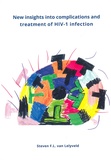New insights into complications and treatment of HIV-1 infection

Lelyveld, Steven van
- Promoter:
- Prof.dr. A.I.M. (Andy) Hoepelman
- Co-promoter:
- Dr. N.A. (Kiki) Tesselaar & dr. A.M.J. (Anne) Wensing
- Research group:
- Borghans Tesselaar , Hoepelman , Wensing Nijhuis
- Date:
- March 12, 2013
- Time:
- 14:30 h
Summary
In this thesis the complications and treatment of HIV-1 infection in the current era was studied. Life expectancy of HIV-infected patients has increased enormously with the introduction of combination antiretroviral therapy (cART). In line with this observation, we found that the outcome of HIV-infected patients with critical illnesses admitted to the intensive care unit has improved accordingly. However, in a nationwide cohort study we found that in 27.5% percent of patients who were treated successfully with cART (leading to suppression of HIV virus in the blood), the immune system (measured by CD4+ T cell count) did not recover to normal levels (‘suboptimal immunological response’). We observed that in these patients the long-term clinical outcome is worse as compared to patient with normal restoration of the immune system, despite the fact that the HIV virus is suppressed. In another study we describe the selection of drug resistant HIV in the central nervous system of an HIV-infected patient as a result of poor penetration of cART (due to limited treatment options). This case study underlines the potential danger of poor penetration of cART in an HIV sanctuary site such as the central nervous system. Furthermore, clinical, immunological and virological aspects of treatment with maraviroc, a CCR5-antagonist registered for R5-tropic HIV-1 virus, were studied. It was found that this antiretroviral drug is a useful alternative in clinical practice, and initial data point out that maraviroc may even be of benefit in patients infected with a dual/mixed-tropic viral population. The CCR5 coreceptor is present on the surface CD4+ T cells and various other cells of the immune system and is suggested to be important in processes such as T cell activation and leucocyte trafficking, next to inhibition of entry of HIV virus in the cell. We therefore investigated whether addition (‘intensification’) of maraviroc to the antiretroviral regimen of patients with a suboptimal immunological response on cART despite viral suppression, might have additional immunological effects, such as an increase in CD4+ T cell count. In the ‘Maraviroc Immune Recovery Study’, a multicenter placebo-controlled trial, no effect of maraviroc intensification of cART on CD4 cell count was found in general. However, slight effects on CD8+ T cell activation and apoptosis were found, and an observed increase in T cell lifespan in the maraviroc arm was found in a labeling study using deuterated water (D2O). Therefore, further investigations are necessary into the possible immunological effects of maraviroc intensification of cART.